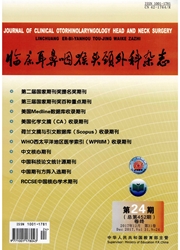

 中文摘要:
中文摘要:
目的:分析中国常见耳聋基因突变在不同听力表型人群中的突变阳性检出率,为指导临床医生更有效率的应用耳聋基因诊断提供依据。方法:具有听力学资料的1 448例先证者接受了一项或多项常见耳聋基因检测,包括GJB2编码区测序、SLC26A4编码区测序以及mtDNA C1494T/A1555G突变基因芯片检测。其中,双耳感音神经性聋1 333例,单耳感音神经性聋65例,高频听力下降或有耳聋家族史但平均听阈正常者50例。所有受检者均已签署知情同意书。结果:1 448例受检者的GJB2基因、SLC26A4基因、mtDNA C1494T及A1555G的突变检出率分别为19.23%、27.55%、0.1%和1.72%;双耳听力下降组的GJB2、SLC26A4的阳性检出率(20.22%,29.17%)明显高于单耳听力下降组(0.00%,0.00%)(P〈0.01);在双耳听力下降组中,GJB2基因突变在双耳极重度聋组检出率最高(24.67%),其次是重度(22.33%)、中度(14.33%)和轻度(6.58%)(P〈0.01);SLC26A4基因突变在重度聋组检出率最高(48.67%),其次为极重度(28.42%)、中度(21.16%)和轻度组(8.93%)(P〈0.01)。结论:双耳重度、极重度感音神经性聋患者的GJB2和SLC26A4基因突变阳性检出率较高,应重视对这一耳聋人群,特别是出生至青少年这一年龄段人群的常规耳聋基因诊断;但对听力损失较轻的耳聋患者,在条件允许的情况下,也应进行常规耳聋基因检测。
 英文摘要:
英文摘要:
Objective:To analyze the positive rate of common genetic mutations in Chinese non-syndromic sensorineural hearing loss groups with different hearing phenotype.Method:One thousand four hundred and forcy-eight subjects with hearing test results received at least one of three genetic testings including: mutations in coding region of GJB2 and SLC26A4 with sequencing analysis and mitochondrial DNA C1494T/A1555G with microarray detection.Of 1 448 subjects,1 333 have bilateral sensorineural hearing loss,65 have unilateral hearing loss and 50 have normal hearing threshold even though they have high frequency hearing loss or family history.The informed consent of each subject was achieved.Result:Mutation positive rate of GJB2,SLC26A4 and mtDNA C1494T/A1555G of 1 448 subjects were 19.23%,27.55%,0.1% and 1.72% respectively.The positive rate of GJB2 and SLC26A4 mutations in bilateral hearing loss group(20.22%,29.17%) was statistically significantly higher than unilateral group(0,0)(P0.01).In bilateral hearing loss group,the positive rate of GJB2 mutations was highest in the profound group(24.67%),and then severe(22.33%),moderate(14.33%) and mild group(6.58%)(P0.01).The positive rate of SLC26A4 mutations was highest in the severe group(48.67%),and then profound(28.42%),moderate(21.16%) and mild(8.93%)(P0.01).Conclusion:The positive rate of GJB2 and SLC26A4 mutations is high in the groups with bilateral profound and severe sensorineural hearing loss,whose genetic testing should be put emphasis on.However,the genetic testing should be performed in patients with mild to moderate hearing impairment as well if necessary.
 同期刊论文项目
同期刊论文项目
 同项目期刊论文
同项目期刊论文
 Novel compound heterozygous mutations in theMYO15A gene in autosomal recessive hearing lossidentifie
Novel compound heterozygous mutations in theMYO15A gene in autosomal recessive hearing lossidentifie Genetic mutations in nonsyndromic deafness patients of Chinese minority and han ethnicities in Yunna
Genetic mutations in nonsyndromic deafness patients of Chinese minority and han ethnicities in Yunna Novel Compound Heterozygous TMC1 MutationsAssociated with Autosomal Recessive Hearing Loss in aChine
Novel Compound Heterozygous TMC1 MutationsAssociated with Autosomal Recessive Hearing Loss in aChine Distinct and novel SLC26A4/Pendrin mutations in Chinese and U.S. patients with non-syndromic hearing
Distinct and novel SLC26A4/Pendrin mutations in Chinese and U.S. patients with non-syndromic hearing Loss-of-function mutations in the PRPS1 gene cause a type of nonsyndromic X-linked sensorineural dea
Loss-of-function mutations in the PRPS1 gene cause a type of nonsyndromic X-linked sensorineural dea Comprehensive molecular etiology analysis of nonsyndromic hearing impairment from typical areas in c
Comprehensive molecular etiology analysis of nonsyndromic hearing impairment from typical areas in c Molecular Epidemiology and Functional Assessment of Novel Allelic Variants of SLC26A4 in Non-Syndrom
Molecular Epidemiology and Functional Assessment of Novel Allelic Variants of SLC26A4 in Non-Syndrom Novel Compound Heterozygous TMC1 Mutations Associated with Autosomal Recessive Hearing Loss in a Chi
Novel Compound Heterozygous TMC1 Mutations Associated with Autosomal Recessive Hearing Loss in a Chi Novel compound heterozygous mutations in the MYO15A gene in autosomal recessive hearing loss identif
Novel compound heterozygous mutations in the MYO15A gene in autosomal recessive hearing loss identif Identification of a p.R143Q dominant mutation in the gap junction beta-2 gene in three Chinese patie
Identification of a p.R143Q dominant mutation in the gap junction beta-2 gene in three Chinese patie Common Molecular Etiologies Are Rare in Nonsyndromic Tibetan Chinese Patients with Hearing Impairmen
Common Molecular Etiologies Are Rare in Nonsyndromic Tibetan Chinese Patients with Hearing Impairmen Rapid screening for the mitochondrial DNA C1494T mutation in a deaf population in China using real-t
Rapid screening for the mitochondrial DNA C1494T mutation in a deaf population in China using real-t SLC26A4 gene copy number variations in Chinese patients with non-syndromic enlarged vestibular aqued
SLC26A4 gene copy number variations in Chinese patients with non-syndromic enlarged vestibular aqued 期刊信息
期刊信息
